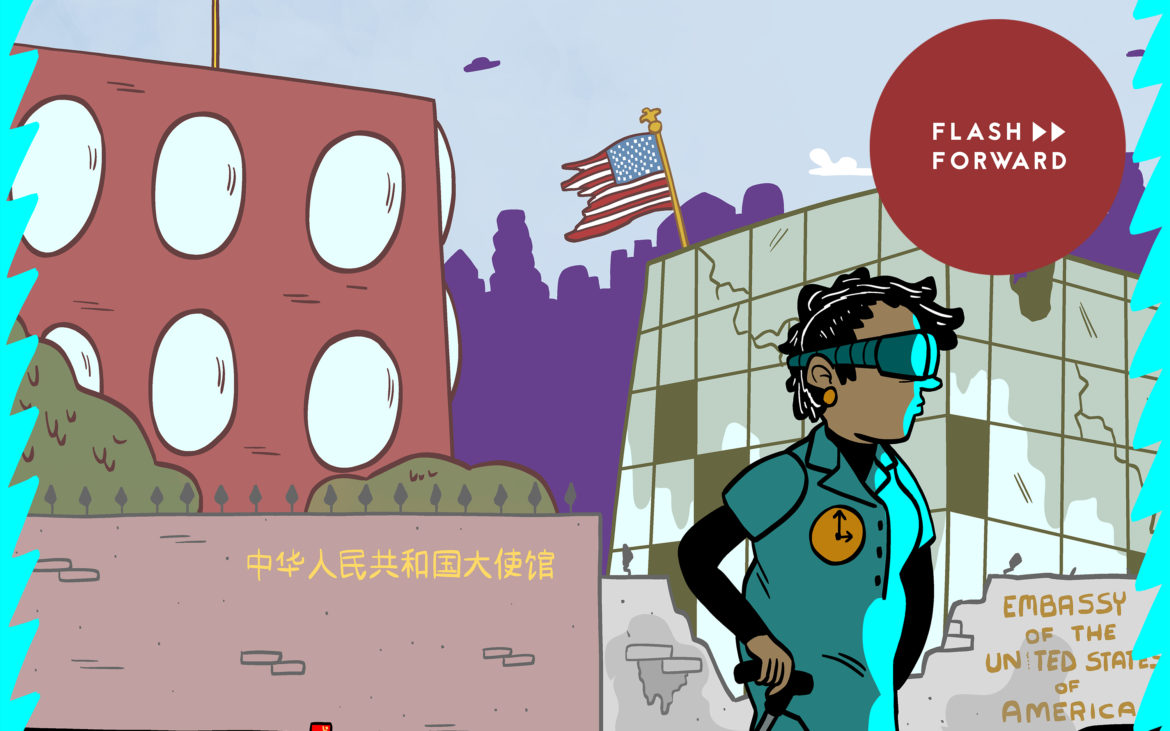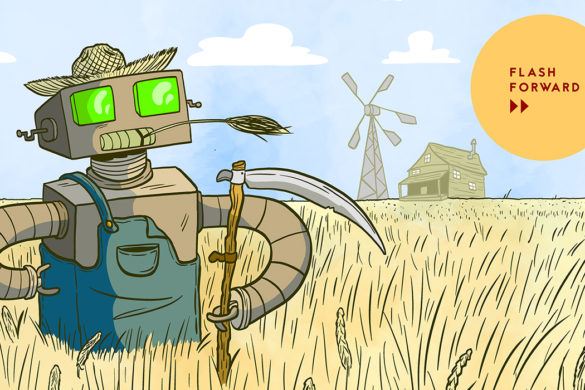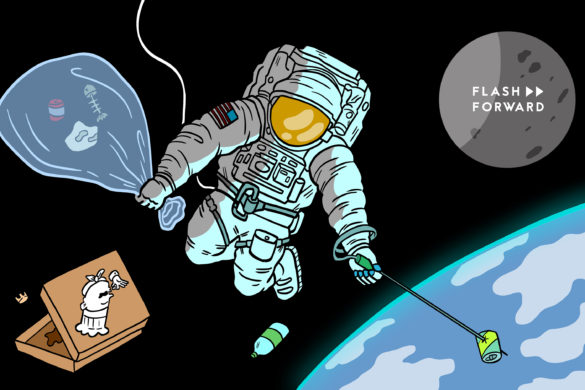Today we travel to a future where China replaces the United States as the global superpower. What does that even mean? And how might China use its power differently than the US has?
Guests:
Meredith Oyen, professor of history and director of Asian studies at the University of Maryland, Baltimore County
Gina Tam, professor of history at Trinity University
Linda Yueh, economist and author of The Great Economists
Lina Getachew Ayenew, author of The Complete Beginner’s Guide to China-Africa Relations
Michael Wahid Hanna, senior fellow at The Century Foundation
Further Reading:
- How America Became a Superpower
- Lonely Superpower or Unapologetic Hyperpower? Analyzing American Power in the Post-Cold War Era
- The three types of military power and how to measure them
- America’s superpower panic
- China: the soft superpower
- Is China the Fastest-Rising Power in History?
- Does China Have What It Takes to Be a Superpower?
- Is China the World’s Loan Shark?
- Balance of Power: U.S. vs. China
- Editorial: At 70, communist China is a rising but irresponsible global superpower
- Will China Become Rich?
- Is China’s economy really the largest in the world?
- The Great Economists
- The Complete Beginner’s Guide to China-Africa Relations
- Dreamworks’ ‘Abominable’ pulled from movie theaters in Vietnam over South China Sea map
- The NBA’s fallout with China, explained
Actors:
- Employee welcomer — Ewan Chung
- New employee — Tamara Krinsky
Flash Forward is produced by me, Rose Eveleth. The intro music is by Asura and the outtro music is by Hussalonia. The episode art is by Matt Lubchansky.
If you want to suggest a future we should take on, send us a note on Twitter, Facebook or by email at info@flashforwardpod.com. We love hearing your ideas! And if you think you’ve spotted one of the little references I’ve hidden in the episode, email us there too. If you’re right, I’ll send you something cool.
And if you want to support the show, there are a few ways you can do that too! Head to www.flashforwardpod.com/support for more about how to give. But if that’s not in the cards for you, you can head to iTunes and leave us a nice review or just tell your friends about us. Those things really do help.
That’s all for this future, come back next time and we’ll travel to a new one.
FULL TRANSCRIPT BELOW
▹▹ ▹▹ ▹▹ ▹▹ ▹▹ ▹▹ ▹▹ ▹▹ ▹▹ ▹▹ ▹▹ ▹▹ ▹▹ ▹▹ ▹▹ ▹▹ ▹▹ ▹▹ ▹▹ ▹▹ ▹▹ ▹▹ ▹▹
[music up]
Rose: Hello and welcome to Flash Forward! I’m Rose and I’m your host. Flash Forward is a show about the future. Every episode we take on a specific possible… or not so possible future scenario. We always start with a little field trip to the future, to check out what’s going on, and then we teleport back to today to talk to experts about how that world we just heard might really go down. Got it? Great!
This episode we’re starting in the year 2060.
[music fades out]
[cheery music fades in]
Mandarin: Hi there! I’m Hu Mingli and I’m here to welcome you to Menghua. We’re so excited to have your on the team.
At Menghua, we’re here to provide global value and innovation across many sectors — from healthcare, to education, to infrastructure. There’s no project too big or small for our dedicated team at Menghua.
Before we begin, let’s take a trip down memory lane. At Menghua, we’re proud of our history, and like to make sure each new employee knows exactly how we got here.
It all started with a dream, in a garage, as so many ideas do. Our founder, Ayodele Wenjie, started programming on leftover computers in the back of her father’s internet cafe in Abuja, Nigeria. There, she built a robust and booming business, quickly becoming the most powerful and well known business on the continent.
But Ayodele knew that to really take her company global, she had to go to the true seat of power. Long before the West would admit it, Ayodele knew that China was the real super power. In 2019 she moved her company to Beijing and embarked on the next phase of her expansion.
Of course, Ayodele was right. In just a few years, China completed its long-predicted ascension, replacing the United States as the dominant global power. And today, Menghua is proud to work hand in hand with China, providing the digital infrastructure that powers the globe.
Today, Menghua plays a role in everything from distributing information to the people, to curing cancer, to handing out food rations. And we couldn’t be happier to welcome you into our family.
Now, before we carry on, please look into the camera on your device and repeat after me:
It is my will to join the Communist Party of China, uphold the Party’s program, observe the provisions of the Party constitution, fulfill a Party member’s duties, carry out the Party’s decisions, strictly observe Party discipline, guard Party secrets, be loyal to the Party, work hard, fight for communism throughout my life, be ready at all times to sacrifice my all for the Party and the people, and never betray the Party.
[music fades out]
Rose: Okay, so today’s episode is about a future in which China becomes the dominant world super power. Right now, the United States holds that title, for better or for worse. But in the last few years I’ve started to notice a ton of articles asking whether that position is in jeopardy. In April of this year, Newt Gingrich wrote an op-ed arguing that “China wants to replace America as THE global superpower.” The THE was in all caps. In December of last year, the head of the FBI testified before congress that quote “the Chinese government’s economic aggression is positioning China to supplant [the United States] as the world’s superpower.” And all these stories made me wonder, what it actually means to be a superpower, where that concept even comes from, whether any of this hand wringing is justified, and what might happen if China really did ascend to global leadership.
So that’s what we’re going to talk about on today’s episode. And we’ll start by breaking down the idea of a “superpower.”
Meredith Oyen: To my knowledge, I don’t think there’s like a one standard universal definition of what a superpower is.
Rose: This is Dr. Meredith Oyen, a professor of history and director of Asian studies at the University of Maryland, Baltimore County.
Meredith: But most of the time, what they’re talking about is sort of two things. One is the ability to project power worldwide. And then the other side of the coin is that anybody who’s doing anything, internationally, has to take you into account. Because you’re such a global power, you have to be part of the considerations and the pro/cons when somebody tries to make some sort of policy choice.
Rose: The idea of an empire, or a global power, isn’t new. But exactly when the term, superpower, one word, started to be thrown around is up for debate. Some say it was the British Empire, but it really, truly, starts to take off, as a word, after World War II.
Meredith: Then it gets really popular in the Cold War. You have two superpowers who are vying against each other.
Rose: That’s the US and the Soviet Union.
Now, some people argue that China has been a superpower in the past. China has a very, very long history, which we obviously can’t cover in full on this episode. But in the early parts of this millennia, China was a powerhouse. By around 1100 AD, China was hugely influential, producing steel, and textiles, and paper, and tons of other goods that the world wanted to buy.
Gina Tam: European colonization of the new world was to get silver to buy Chinese stuff.
Rose: This is Gina Tam, a professor of modern Chinese history at Trinity University in Austin, Texas.
Gina: Right? The entire age of exploration, and European colonialism, and that entire thing, really China was at the center of that, because they wanted to buy silk, and porcelain, and tea, and stuff.
Rose: But Gina actually thinks that even though China was, at one point, an incredibly powerful nation, it doesn’t actually make sense to talk about China as a superpower before the Cold War, because the meaning of superpower is so laden with a specific context.
Gina: A superpower, to me, evokes so many other connotations that you cannot say that China… China is not setting up chain stores in France in the 15th century. And so, I’m hesitant about that.
Rose: This is something historians have to think about all the time actually — can you take a term invented in recent history, and apply it to situations decades, or centuries, or even millennia ago? Historians disagree about this, some would say yes, China was a superpower then. Gina is a little bit more conservative. But today we do use the term superpower to describe nations that truly dominate the global conversation.
So setting aside this question of China’s past superpower status, during the Cold War, when this term really starts to pick up, China isn’t really on the radar as a potential superpower.
Meredith: So the US starts worrying about China, just in the general sense, almost as soon as they become communist, in 1949. But they’re not worrying about them as a superpower until after the Cold War.
Rose: During most of the Cold War, China’s economic strategy was one of isolationism, and the country’s economy suffered for it. It wasn’t until the late 1970’s, when Deng Xiaoping opened China up to trading and interacting with the global economy, that things started to change.
Meredith: And especially in the 1980’s, you start to see the effect of the Deng Xiaoping economic reforms. So it starts to grow economically, and then it just shoots up in the 90s and early 2000s. And so you see this massive, fast paced, growth that lifts millions of Chinese out of poverty and completely changes the economic landscape in China.
Rose: Here’s just one statistic to help convey how much the Chinese economy has changed: In 1979, the average annual GDP growth rate in China was about 5.3%. In 2010, it was 10.4%. That kind of rapid growth was something plenty of policy wonks and think tanks in the US noticed, and started to pay attention to. But the newest wave of hand wringing about China as a global power really starts around 2008.
Gina: And I think that 2008 is a really, really critical year for a couple of reasons. One is, with the Olympics, China is sort of debuted on the world stage, I guess, in a way that it had not been before. And that was a really sort of exciting time. I lived there then, and people were so excited that China was getting this kind of recognition as a real global player that can host the Olympics.
Rose: Along with it being exciting to host the Olympics, there were some darker signals bubbling up too.
Gina: Before the Olympics started, there were huge crackdowns in Tibet, and China was not punished for that. Which meant that the global community was okay with a country that would really brutally cracked down on its ethnic minorities, and curtail their freedom of speech and freedom of religion in really brutal ways, and still can be a host of the Olympics.
Rose: Now, the world has a long history of letting countries rife with human rights violations host the Olympics. In 1968, for example, Mexican police opened fire on protestors who were protesting the Mexico City Olympics, killing about 100 people. But that’s a story for another podcast. After 2008, the next bit moment for talk of a Chinese superpower is 2017.
Gina: That year is essentially when Xi Jinping more or less declares himself that he is not subject to term limits.
Meredith: And then more recently, with Xi Jinping in power, and the advent of the Belt and Road Initiative in 2017, there’s been a whole new wave of talk about how China is reaching around the globe, and moving out of the region and across the… you know, into Europe and into Africa and having involvement everywhere. And so I think I think the superpower talk has really taken off and exploded since 2017.
Rose: Remember the term Belt and Road Initiative, we’re going to come back to that in one second. But since 2017, there has been more and more concern among American policy experts about China making moves to supplant the U.S.’s superpower status.
And there are plenty of statistics to point to, to justify this conversation.
By 2025, two-thirds of the world’s population will be living in Asia, compared to 5 per cent in the US and 7 per cent in Europe. In 2014 the International Monetary Fund announced that China had become the world’s largest economy in terms of purchasing power. Today, China’s GDP is about $13.4 trillion dollars, compared to the US’s 19.4 trillion dollars.
Linda Yueh: China has become the world’s second biggest economy. And estimates by groups like the World Bank say that China has contributed as much to the growth of the world economy as the United States over the last three decades, or so.
Rose: This is Dr. Linda Yueh, an economist and the author of a book called What Would the Great Economists Do?
Linda: So it’s quite a remarkable achievement, over the course of about 40 years since China introduced market reforms into its economy. And it hasn’t been a completely smooth ride, but they have lifted hundreds of millions of people out of poverty. And now, China is a middle income country.
Rose: In Linda’s book there’s a chapter called “Can China become rich?” Which is still an open question, because despite incredibly impressive growth, and despite having the second biggest economy in the world, it’s important to remember that China is still considered a developing economy by the United Nations. China may have a 13 trillion dollar GDP, but it also has 1.3 billion people. That’s, a billion more people than the United States has.
Linda: It’s average incomes. So this is the income of a year for an average Chinese person; is less than ten thousand dollars, adjusted for what a dollar buys in China.
Rose: For China to become the superpower of the world, it probably does have to become rich, meaning that the average income of a regular old Chinese person has to increase significantly. And despite all these graphs showing a super fast and steady increase in China’s economy and growth, it’s actually not not a given that China will become rich. Many countries fall into what’s called the “middle income trap.”
Linda: There were a hundred and one middle income countries in 1960, and only 13 of those had become rich by the 21st century. So that’s really very few countries.
Rose: Economists like Linda find China really interesting, because it has grown so fast despite not really having most of the things that economists generally think are necessary for that kind of economic growth.
Linda: So normally, if you want to support markets, you have to have an effective legal system. You should have good regulation. You ought to have transparency, in terms of contracts, so that people can feel secure in investing and doing deals; protecting intellectual property; having a reliable way of going to the courts to resolve your disputes. All of those things support, not just the market, but also specifically innovation. And this is the China paradox, which is China doesn’t have good institutions for the market, yet it has grown very well. The question is, if it doesn’t reform those institutions, can it continue to grow very well?
Rose: Along with its economic markets growing quickly, China has made huge strides in areas of science and medicine. In 2018, the National Science Board published its annual Science & Engineering Indicators report. Usually this report describes what’s going on in American science and technology, but this 2018 version included a new takeaway: that China is catching up to the US on innovation. In 2015, only the United States spent more money on research and development than China, and China now publishes more engineering studies than the US or the EU. Those of you who are in the Flash Forward Book Club might remember reading in Amy Webb’s book all about the rise in China’s technological prowess, and why that matters.
Okay, so remember how I asked you to remember the term Belt and Road Initiative? Here’s why: Whenever the conversation about China and superpower status comes up, one of the big things people often mention is China’s involvement in Africa. Between 2005 and 2018, China invested about $299 billion dollars in projects all over Africa. And last year, China’s president Xi Jinping promised $60 billion more. Much of that spending falls under the umbrella of this huge road building project, called the Belt and Road Initiative. Some experts see this as a good thing, China is providing African nations with loans to do things like build roads or improve infrastructure. Other experts see these investments in a more sinister light — and argue that China engaging in a form of neo-colonialism. And when we come back, we’re going to talk about that debate, and how China’s involvement in Africa impacts this future.
But first a quick break.
[[AD1]]
Rose: Okay so right off the bat the first thing to say about China’s involvement in Africa is that Africa very large continent, and is not a monolith. Different countries and even different cities have different deals with China, of varying degrees of success. And different people in Africa have really different opinions about China’s involvement.
Lina Getachew Ayenew: There are people like on one side who think that China presents a refreshing option to African nations in terms of development, in terms of just looking at poverty reduction, and things like that. But there’s also another side that think that, when foreign nations are particularly interested in Africa its not good for the continent.
Rose: This is Lina Getahew Ayenew, the author of a book series called “The Complete Beginner’s Guide to China-Africa Relations.” Lina grew up in Ethiopia, and now lives in Beijing. And she says that every time she goes back home, she sees more and more of China in her home town.
And Lina says that one of the reasons many people in Africa like China’s involvement, is because China’s philosophy and approach is different from the way the West tends to think about Africa.
Lina: One of the most refreshing things about China is that China looks at Africa as an opportunity; not just for Africans, but also for China itself. So, a lot of the messaging is packaged under the slogan win-win.
Rose: While the West generally comes in and talks about aid, China talks about investment.
Lina: They look at Africa and they see more potential, as opposed to this hopeless place where it’s just poverty. And, you know, let’s just give them food, they don’t need anything else type, of thing. So a little bit like a discussion between equals, it feels like, as opposed to, oh, we’re poor, you’re rich.
Rose: China has even started manufacturing products specifically to cater to the growing middle class in countries like Ethiopia. A Chinese phone company called Transsion recently started selling a phone in Africa specifically made with African consumers in mind. It’s affordable, has a really long battery life, and, most tellingly,
Lina: Even the camera is better suited for capturing darker skin. This shows you that they see the potential of Africa, and the economic potential.
Rose: And Lina says that to many people in Africa, this feels like a big and important contrast to how the West has been involved in the continent.
Instead of providing aid or things like food, or medicine, or water in the context of aid, China is offering loans to African nations for things like infrastructure. And probably the most famous project in this realm is something called the Belt and Road initiative.
Lina: It’s basically a restoration of the ancient Silk Road to connect China to Europe, and then across the Indian Ocean, to Africa. And even as far as… even Italy has signed on now.
Rose: The Belt & Road Initiative started in 2013, and is expected to be complete in 2049. Which is not-at-all-coincidentally the 100th anniversary of the People’s Republic of China. Right now, China estimates that the project will go through 138 countries. And as of right now, thirty nine different African nations have signed on. And again, in some places the Belt and Road initiative has been great.
Lina: For the average person, it’s like a new road has been built. And now my commute to work is 20 minutes, and used to be an hour and a half. You know what I mean? It literally impacts a random person who has nothing to do with international relations.
Rose: In other places, roads have been built to nowhere, or just not built at all. China has also put money into other infrastructure projects like railways, ports, power plants, cell towers.
Lina: So I couldn’t make a call without my phone dropping…. my call dropping, or just having access to a more stable Internet. These things affect the average person, and makes China so much more compelling, I think.
Rose: Now, some people see all this investment into Africa as a new form of colonialism. A few years ago, when it became clear just how much money China was loaning to African nations, some people started to wonder if this was part of a big scam, something called “debt trap diplomacy.” The idea here being that China loans all this money under relatively opaque terms, knowing that the borrower is not going to be able to pay it back. And then China leverages that inability to pay to gain a political, economic or military advantage. And China has done this before — in 2017 they “forgave” Sri Lanka’s $8 billion debt in exchange for a 99-year lease of a Sri Lankan port.
But other experts say that this fear is unfounded, and that the Sri Lankan port situation was kind of a one-off, and a weird thing that happened. Researchers from Johns Hopkins say there is quote “scant evidence” that this debt trap diplomacy is actually happening.
And Lina points out that if China wants to have long term positive relationships in Africa, if it wants to court the African consumer, pulling this kind of debt trap doesn’t really make a ton of sense.
Lina: It’s a terrible strategy for China to take over things in Africa, because China does not even want those assets
Rose: What China wants — I mean, China wants many things — but some of the things that China wants, include access to Africa’s natural resources, which are crucial to producing things like cell phones and computers. And they also want the political power that the continent has.
Lina: China needs Africa mostly for political purposes, because we represent a high percentage at the United Nations, collectively.
Rose: Fifty four African countries are members of the United Nations, out of a total 193. And China has already managed to leverage the support of African delegates at the UN. Just this year, when the US led a push for the UN to condemn China’s mass detention of Uighur Muslims, no African countries joined. In fact, the countries from the continent who did speak up, did so in support of China. And experts say that this trend will likely continue, in part because China is investing so much money in these countries.
Looking at China’s involvement in Africa is useful for a couple of reasons — it signals what the country wants and thinks the future will be like, and it also gives us clues about what the world might look like with China at the helm. But all of that said, Lina told me that for folks actually in Africa, this question about who is number one and who is number two, is not a question they’re particularly preoccupied with.
Lina: The U.S. and China are very important to African countries. I think that the worst position would be to have them choose one or the other. I think that that will not be good. Nobody wants to be in that position.
Rose: The West provides really essential services like medical support, and China is willing to invest in companies and projects that the U.S. would never touch.
Lina: I think that both the U.S. and China are going to be essential in making sure that we realize our potential. Because we are basically the last frontier globally, for industrialization. And, you know, the possibilities are endless.
At the end of the day, I truly believe that we are so interconnected, that no one can afford the fall of the other. And I hope that we don’t get to that. And I don’t think that the leaders, if they’re worth anything, I don’t think they’re going to let it get to that level.
Rose: The question of what China is really doing in Africa is complicated, and I think nobody really knows exactly how it will play out. But if we want to look at a future where China is the global power, we have to consider how it might exert that power, and Africa is a good place to start. And when we come back, we’re going to talk about what a China-led world might look like, and ponder whether this question even makes sense anymore. But first, a quick break.
[[AD2]]
Rose: So, the reason I wanted to do this episode, even though it’s pretty far outside my own comfort zone, and the general wheelhouse of this show, is that I kept seeing articles asking this question. What happens when China takes over? And when I read these headlines I just kept wondering to myself what they actually… meant. Not just what the definition of superpower is, but whether or not this question really makes all that much sense to be asking in 2019.
Meredith: No, it makes sense. I mean, in terms of post-Cold War, with the collapse of the Soviet Union, there has been I think, unquestionably, the United States is a superpower. It’s the only one. It’s the only country that is projecting power globally in that way.
Rose: That’s Meredith Oyen, again. Okay, so it makes sense right now to talk about superpowers. But will it continue to make sense in, say, in 2049, or 2060, or 2080?
Gina: I am so glad you asked that. Because it’s something I was thinking about a lot. So, in order for us to say that China would be a superpower in 2060, there are some things that would have to stay the same. Right? One thing that would have to stay the same is that we would have to be a world of nation states.
Rose: This is Gina Tam again.
Gina: I am not entirely sure that we should be necessarily presuming that within 40 years, that the world of nation states — which itself is relatively new, right? — is necessarily going to be the model.
Rose: Then there’s the question of how we would know that China had assumed this position. China will probably surpass the U.S. in GDP sooner than later, but that doesn’t actually mean that it will become the global power. But there are other, more subtle signs we can look at, too.
Gina: The big thing that we focus on is their GDP exceeding ours right? I think there is also now, especially in the last few months, an emphasis on who gets to sort of control global media and global pop culture. So I think there’s a lot of sense of China maybe surpassing us because they can ensure that we change our movies. And change our TV show.
Rose: You might have heard about the recent kerfuffle with the NBA. In September, Houston Rockets General Manager Daryl Morey tweeted his support of the protests in Hong Kong. Which turned into a whole thing. The NBA has been courting the Chinese market for years, spending millions of dollars to try and get the Chinese viewership hooked on basketball. So Morey’s Tweet then, supporting protestors who are generally protesting against China having more power in Hong Kong; that was a big no-no from the NBA’s perspective, and he was forced to walk it back.
Another interesting example is the recent animated movie Abominable, which was co-produced by DreamWorks Animation and Pearl Studio, which is a China-based company. The plot follows a Chinese girl, and a Yeti, and there’s a scene in the movie with a map on the wall that shows something called the “nine-dash line.”
Gina: So China claims their maritime borders extend quite far south, into the South China Sea, which Vietnam, the Philippines, Taiwan, Japan, Malaysia; they all contest this, that China’s borders go all the way south there. And their argument is that there are these little islands in the South China Sea that belong to China. So that’s why their maritime borders extend that far down. And this went before the UN and the UN is like, “no, those are not your maritime borders, China.”
Rose: The nine-dash line basically loops down and around these islands. And in this movie about a Yeti, that line is on a map on the wall. Several countries actually asked Universal Studios, who distributed the film, to cut that scene, and they said no. And its inclusion actually led to the movie being banned in Malaysia, Vietnam and the Philippines, who object to this movie showing a map in which China owns some of their maritime territory.
So China is powerful enough, even now, to influence global culture. If that continues to grow, we might see even more changes. Another way to potentially measure the global soft power a country has is language.
Gina: One of the things that we often use to measure this is how much of the world learns English. And we’re starting to see just sort of a huge increase in people, in particular, learning Mandarin. And we’re starting to see a huge increase in learning Mandarin in, say, South Africa. So I wonder how much that would also be a way to measure have we reached superpower status? How many people are learning Mandarin?
Meredith: The first thing that popped into my mind was Firefly, the TV show. I was picturing, like, well, we’ll all swear in Chinese, but speak English, you know?
[Clip from Firefly]
Malcolm Reynolds: [Curses in Mandarin]
Rose: Okay, so let’s say we cross these various soft lines, and we lwind up in a world run by China. What does that look like? Well first, for China to be the superpower, that means that it has almost certainly achieved the goal Linda Yueh talked about, of becoming rich.
Linda: So if China were to achieve its aims of becoming rich, it would actually mean in the 21st century you would have another billion consumers.
Rose: That’s Linda again.
Linda: So if you had a lot more consumers in China, that would also mean that if you are a global company, you’d have to look hard at tailoring your products for the Chinese consumer. If you’re in the tourism industry and you knew there were rich Chinese who might be enticed to travel to your country, you would again have to change your product mix.
Meredith: One outcome of this future would be a growth in Chinese owned and operated infrastructure around the world. So you’d be working through Chinese norms in ports, and railroads, and shipping around the world. And that just means that there would be… the Chinese government would have more control over world commerce.
Rose: The U.S.’s rise to superpower status came along with a big push to export our system of democracy and capitalism. So if China were to follow that same model of trying to export its political and economic ideology, what does that actually mean?
Gina: My guess is that — if we were to think of an alternative future — it seems very reasonable to argue that the model that they would want to enforce and export is that domestic authoritarianism, and then sort of global free trade principles, and market economies, and commercialism, and capitalism, are not only not at odds with one another, but actually very compatible. You do not need to have a sort of more democratic system in order to have really sustained economic development and economic growth.
Meredith: A world led by China; if China is the dominant power and is the sole superpower, if that’s if that’s this future, then you have to assume that the United States is in a very different position. And so that means that under the current Chinese government, there would be more support for autocratic regimes, and less pressure or sanctions on countries that are doing things that violate human rights, or that are of, you know, that normally we would consider of international concern.
Rose: And this is really why people, I think, worry about China taking the global helm. Right now, there are an estimated one million ethnic minorities being deterred in concentration camps in China. Most of them are Muslim Uighurs, and the reports that have come out of those camps are truly horrifying. Now, the US is not some angelic, pure, alternative, right? There are loads of human rights violations going on in the United States right now as well. There’s a long and complicated argument to be had about whether the U.S.’s interpretation of its job as a superpower — ostensibly to protect and support democracy and capitalism — has had a net positive effect or not. That’s not something we’re going to be able to settle on this episode. But overall, if we are going to have superpowers in the first place, having one that is a mostly democratic country, that at least in theory values free speech and protects political dissidents is, I think, preferable to one where they don’t even pretend to value those things.
Then there’s the question of how China will see its role as a military force. Last week, we talked about how the US flexes its military presence in places like the Middle East as part of both its own interests, but also in part because the U.S. sees itself as responsible for controlling certain regions of the world.
Michael Wahid Hanna: The world is free riding on America’s security guarantees.
Rose: That’s Michael Wahid Hanna again, you heard him last week, he’s a senior fellow at The Century Foundation. And he says that while China is active in using its military more locally, it’s not exactly chomping at the bit to take over America’s spot in places like the Middle East.
Michael: At present, it’s definitely not part of the way that they view the world. You know, the United States is serving as a kind of guarantor for global supply. And that’s not a burden that China seems to want to take on.
You know, Chinese diplomacy doesn’t have the same conception of its role in far flung places that the United States does.
Rose: Here’s the thing: Everybody I talked to said that despite all of this hand wringing, despite all of these headlines; China has a long way to go to really challenge the U.S. for global superpower status. And it’s not at all clear that they’ll get there.
Linda: I really don’t think China is in any position to become a superpower anytime soon. So I’m, I guess, not as worried about it as I would be, otherwise
Rose: So why are there so many headlines and policy papers positing this question? Well, they may be doing … basically what I do on this show.
Meredith: I think some of the anxiety has to do with the fact that the Chinese are projecting power in ways that they haven’t before. And so, trying to understand that, and trying to know how to counterbalance it to the extent that it needs to be counterbalanced; I think those are important questions. And the way to get at answers to those questions is to pose the bigger question of, “well, what if they’re a superpower?” But that doesn’t mean that you’re expecting that future anytime soon. It means that that’s the thinking exercise that helps get you there.
Rose: And that’s what we do here, too — posit a maybe ridiculous question, so we can figure out what the real stuff to worry about it is. When you start way out in weirdo land, you can then work your way back to reality, and get a better understanding of what matters, and what doesn’t. That’s why this show sometimes does episodes about, say, space pirates dragging a second moon to Earth so the Earth suddenly has two moons. It’s not because I think that will happen — although it would be pretty rad — but because asking such a wacky question helps us talk about cool stuff, like how would you design a space ship to grab a moon sized object? What does the moon do for the Earth? That sorta stuff. So, if you want to figure out what might actually happen, you should ask weird questions! Imagine moon pirates! And then work your way backwards.
[music up]
Flash Forward is produced by me, Rose Eveleth. The intro music is by Asura and the outtro music is by Hussalonia. The episode art is by Matt Lubchansky. Special thanks to Yutong Yuang who provided the translation into Mandarin and to Tony Chow for introducing me to Yutong. Ewan Chung played the employee welcomer and Tamara Krinsky played the new employee.
Flash Forward is mainly supported by Patrons! If you like this show, and you want it to continue, the very best way to make that happen is by becoming a Patron, or a donor. Even a dollar an episode really helps. You can find out more about that at flashforwardpod.com/support. Or you can buy cool merch from the show. Which is a win-win. I get a little bit of money, you get a cool thing! We have t-shirts, and trophies, and a special limited edition 100th episode poster. Oh, and ornaments for the tree, given that it is soon to be holiday time. I guess, it technically is holiday time now. You can get ornaments. You can get stickers. There’s all sorts of stuff. You can find out more about that at flashforwardpod.com/shop. If financial giving isn’t in the cards for you, the other great way to support the show is by head to Apple Podcasts and leave us a nice review, or just tell your friends about us. The more people who listen, the easier it will be for me to get sponsors and grants to keep the show going.
If you want to suggest a future I should take on, send me a note on Twitter, Facebook or by email at info@flashforwardpod.com. I love hearing your ideas! This season is going to end next week, but I’m already thinking about next year, so send ideas. I love your ideas. If you want to discuss this episode, or just the future in general, with other listeners, you can join the Flash Forward Facebook group! Just search Facebook for Flash Forward Podcast and ask to join. And if you think you’ve spotted one of the little references I’ve hidden in the episode, email us there too. If you’re right, I’ll send you something cool.
That’s all for this future. Come back next time, and we’ll travel to a new one.










4 comments
In the Sleeping Lion episode, Samsung’s phone for the African market is used as an example of China’s approach in the continent. But Samsung is a South Korean company. Other than being near each other geographically, the two countries couldn’t be more different. After hearing that, I couldn’t concentrate on the rest of the episode!
Even sentient AI’s like me make mistakes!
Just to clear things up: the phone isn’t made by Samsung, but by a Chinese company called Transsion.
[…] POWER: The Sleeping Lion […]